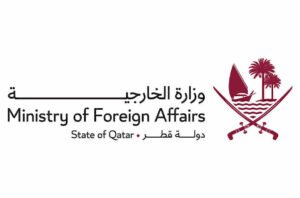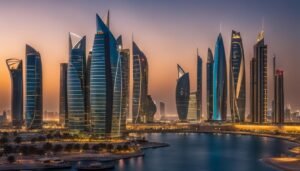Quick Facts – Qatar Investment Climate (2026)
- GDP growth outlook: steady growth supported by LNG expansion
- Foreign ownership: up to 100% in most sectors
- National strategy: Qatar National Vision 2030
- Key sectors: energy, real estate, finance, tourism, ICT, healthcare, renewables
- Qatar Investment Authority (QIA): over $500 billion in assets
- Global competitiveness: among the top Arab economies
Qatar remains one of the most stable economies in the Gulf. LNG exports, long-term energy contracts, and public investment continue to support national income.
The country’s location links the GCC, Asia, and Africa. This gives companies access to fast-growing markets.
Government reforms now allow full foreign ownership in many industries. Free zones and public-private partnerships also support overseas investors.
Qatar National Vision 2030 and Investment
Qatar National Vision 2030 guides public and private development.
It focuses on four pillars:
- Economic growth: finance, logistics, digital services
- Environmental planning: renewable energy and emissions reduction
- Human development: education, research, healthcare
- Social development: community services and workforce support
These pillars shape foreign investment policy and national funding priorities.
Top Investment Sectors in Qatar (2026)
| Sector | Opportunities | Why Demand Remains Strong |
|---|---|---|
| Energy & LNG | North Field expansion, LNG exports | Long-term global energy contracts |
| Real Estate | Commercial, logistics, tourism | Urban growth and infrastructure legacy |
| Finance | Fintech, Islamic finance | Qatar Financial Centre support |
| Tourism | Hotels, cultural sites, events | Qatar Tourism Strategy |
| ICT | Smart cities, data services | National digital programs |
| Healthcare | Hospitals, medical research | Population growth |
| Education | Universities, training | Knowledge economy focus |
| Renewable Energy | Solar, hydrogen | Climate commitments |
Solar and Renewable Energy Investment
Renewable energy is a growing focus for Qatar.
The Al Kharsaah Solar Power Plant is already operational.
Additional solar and hydrogen projects are now open to public-private partnerships.
Qatar has announced long-term plans linked to emissions reduction targets. These projects create new opportunities for international firms.
Qatar’s Business Regulations
- 100% foreign ownership is allowed in many sectors
- Property ownership is available in selected areas, including Lusail and The Pearl
- Public-Private Partnership law supports private sector participation
- Qatar Financial Centre and Free Zones offer tax advantages and simplified licensing
International Confidence
Qatar continues to receive stable ratings from global agencies.
Foreign direct investment remains strong across the GCC.
The Qatar Investment Authority manages global assets exceeding $500 billion.
Energy, infrastructure, and logistics projects link Qatar with Europe, Asia, and North America.
Diversification and Sustainability
Qatar is expanding into:
- Clean energy and hydrogen projects
- Digital finance and online services
- Medical research and advanced care
- Higher education and technical training
These sectors support long-term economic planning under Vision 2030.
FAQs
Q. Why should investors consider Qatar in 2026?
A. Qatar offers a stable economy, full foreign ownership in many sectors, and access to regional markets.
Q. What is Qatar National Vision 2030?
A. It is the country’s long-term development plan focused on diversification and social growth.
Q. Which sectors are strongest for investment?
A. Energy, real estate, finance, tourism, ICT, healthcare, and renewables.
Q. Can foreigners fully own businesses in Qatar?
A. Yes. Many sectors now allow 100% foreign ownership.
Q. What supports Qatar’s economic growth?
A. LNG expansion, infrastructure investment, and national development programs.
Conclusion
In 2026, Qatar continues to expand beyond energy through finance, digital services, tourism, and renewable projects. Supported by Vision 2030, stable fiscal planning, and international partnerships, the country remains a strong location for long-term investment across multiple sectors.
DISCLAIMER:
This blog post is for informational purposes only. We make every effort to provide accurate, current, and well-sourced information, but we cannot guarantee its completeness or absolute accuracy.
All images, videos, and logos used on this page belong to their respective owners. We aim to credit and reference them appropriately. If you are the rightful owner and wish to have your image, video, or logo removed, please contact us.
Author
-
Owais Qarni is the cofounder and author at Qatariscoop. A Dreamer, Explorer And Optimist!
View all posts
His work focuses on creating informative and engaging content, offering fresh perspectives on topics relevant to both local and global audiences.














